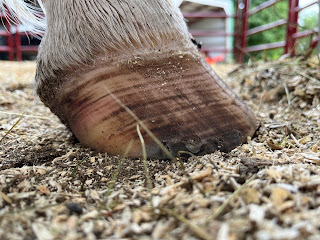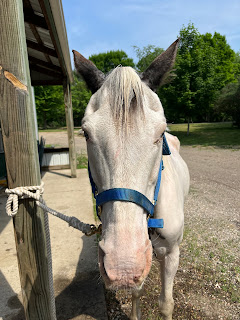Our son lost his beloved gelding, Cutter, last summer from a twisted gut, as it’s called. A sudden, violent colic that lasted for hours while the vet tried to determine the cause and control the pain. The field necropsy showed a twisted loop of dead intestine from an unknown cause. It was one of those horrible moments as a parent when you would do anything to take away your child’s pain. All the stress of the move, all of us getting Covid, and then the loss of his best friend. The buddy that carried him through trail rides we did together, especially during lockdowns and virtual learning, where we counted it as PE. Cutter was a horse he bought toys and treats for and taught to fart on command. Cutter was a silly and gentle friend. It was awful to lose him and it took time to mourn the loss.
Finally, this spring we began searching for another suitable mount for our son. His grandpa knows the raw pain of losing a pet and offered to pay for a new trail buddy for John. Since he’s in high school, we discussed a horse that his dad could ride when he went off to college, if need be. I pictured a sleek, shiny bay or chestnut gelding with quiet, patient eyes and a sense of humor. Cutter was a bay Appaloosa. The horse market, however, had changed a lot since we last bought a horse for John in 2019. The prices were so much higher. The search was narrowing in on some camp horses in their late teens/early twenties. One, was indeed, a chestnut gelding. We arranged for a pre-purchase exam with our vet for the following week, but kept looking. I was worried about a horse that old. Goodbye would come too soon after such a hard loss.
Meanwhile, an ad I had seen for at least a month got another look. A 12 year old white, possibly pinto, mare either had terrible conformation, or was far too skinny. It was difficult to tell for sure from the pictures.
We pulled into the older farm and met with a young lady who led us to some loose wire enclosing a dirty corral with several mares milling about near an empty feeder while the very skinny pinto mare had her head inside a hole she had excavated in the center of a decrepit round bale. All of her ribs were visible under a raggedy coat with winter hairs still clinging around her barrel. Various bumps, scratches, bites and rashes covered her. Her hips stuck out and her flank sunk in. Her neck was skinny and the pink skin around her blue eyes looked slightly swollen. I have always avoided excessive white markings and blue eyes because pink muzzles and pink skin around eyes require higher maintenance, such as sunblock and fly masks that block some of the UV light to lower the risk of melanoma. We were here to look at her and one other mare advertised. All of the other mares were in good weight. I heard the young lady say that the other mare was more energetic and that the pinto was slow.
“You have to spur her to get her to go faster than a walk”, she informed us.
I masked my feeling of horror at the thought of riding such a bony mare. I was here for a horse for our son. I exchanged looks with John and said, “The slower one would be more suitable.”
The young lady unclipped the loose wires that made a makeshift gate and haltered the little mare. As she walked her past, I looked at John and said quietly, “I just want to take her home and feed her.”
My college buddy and horse trainer, Rachel, helped me in real time by looking at pictures and a video of the mare. She didn’t see anything structurally wrong with her. In fact, she said she was well put together. This could work, I thought to myself.
The young lady saddled her up and showed us how she rides. I asked her only to walk away from the horse corral to evaluate her home bound enthusiasm. The ride was very brief. I got on next for a few minutes to see how she was when I turned her away and made her walk away from her friends. John tried her afterwards. He got her to move away, and despite her eagerness to return to her friends, the oversized bridle that caused the bit to clunk her teeth, and her sad condition, her naughtiness was only manifested in some slight balking. Five minutes was enough to assure me that she wasn’t crazy. I looked at John, who already knew my mind. This mare needed us. She needed a vet check and lots of good food. As John explained to his dad later, it progressed quickly from “what do you think?” to “John, go walk your horse and get her some grass.”
We arranged delivery of the mare that evening. The young lady was relieved. She explained that she bought the mare over a month ago, already in terrible condition, from a man in Wisconsin. She was not getting her share with the more dominant mares in the corral and there were some high vet bills for the stallion she had also purchased recently. She meant well, but it was too much to rehabilitate a mare in such poor condition with all the other horses they had. The other animals were in good flesh, so I believed the young lady.
The mare’s name is Matilda. This is how she appeared when we first met her on 6/3. She came home that night. She weighed approximately 600 pounds and stands 14.2 hands tall.




























